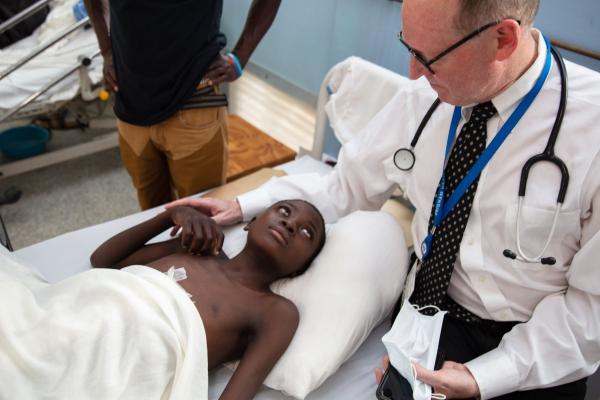The global impact of Dr. Paul Farmer’s work for health equity is undeniable. Of him, personalities such as Bill Gates have said, “The only time Paul sought the spotlight was when he knew he had the opportunity to highlight inequity and speak to the next generation of global health leaders. He gave many graduation speeches over the years, and I suspect he is the reason so many young people have entered careers in public health. He is one of the most inspiring people I have ever met.”
After Haiti and Peru, Paul and Partners In Health set out into the world in the quest to ensure health as a human right for the most vulnerable communities.
During his early years living in rural Haiti, Paul had learned a term used by the locals that would stick with him forever: stupid deaths. That is, deaths from diseases that had safe, effective and affordable treatments, but because of a weakened health care system were inaccessible to the poorest.
“It was to prevent these kinds of deaths that Partners In Health was founded in the 1980s, with the goal of providing care for the trivial or catastrophic illnesses that affected the poorest, who had the most stupid deaths,” Dr. Farmer once remarked.
Coupled with his nomadic spirit, the fight for global health took Paul to places that are often only accessible through maps. One of them, Russia’s icy Siberia. There, in the 1990s, the tuberculosis epidemic had ravaged prisons at levels even worse than those in Peru or Haiti. The rate of prisoners contracting TB is always higher than the civilian population, but in Siberian prisons it was 40 to 50 times higher. PIH reaped achievements, such as reducing MDR TB case fatality from 24% to 0% in just two years.
Paul split his work between Haiti, Peru and Russia before taking on a major challenge. One of the most impoverished continents ravaged by inequality and violence, Africa, would be a mandatory stop on his and PIH’s journey. The first step was Rwanda, in 2005, whose government, social infrastructure and health system was still in ruins from the effects of the genocide against the Tutsi population in 1994.
Dr. Farmer visits Ebola survivor Yabom Koroma and her family at their home in Freetown, capital of Sierra Leone.
There he would begin tireless work to strengthen the public health system in rural Rwanda, a work in which Haitian doctors and nurses from Zanmi Lasante (as PIH is known in Haiti) would also participate, demonstrating that what had begun as a small project in a Caribbean country was not only beginning to scale globally, but also to train the next generation of health equity workers and leaders.
PIH helped the Rwandan government fight HIV, improve maternal and child health, and provide comprehensive, high-quality medical care to more than 860,000 people in the districts of Burera, Kayonza and Kirehe.
From there would come efforts in the fight against the devastating HIV epidemic in Lesotho, where a quarter of the country’s adult population was HIV-positive, and against malaria in Malawi.
In 2014, as the world watched in horror at the effects of the Ebola outbreak in West Africa, Paul did not hesitate to take action as soon as possible. In an interview with The Harvard Gazette, he mentioned that Sept. 10, 2014, was one of his proudest days at PIH, when the board approved that the team could initiate a rapid response against the disease in Liberia and Sierra Leone.
“Ebola spread in West Africa because it’s a public health desert, and it killed because it’s a clinic desert,” Paul would recall of those days when PIH deployed a team of 200 doctors and nurses, as well as 2,000 community agents and local employees.
Behind these and other high-impact interventions were a series of approaches that Paul believed in and that to this day guide PIH’s work in every corner of the world where it has a presence. In terms of health system strengthening, there are five key elements: personnel, material, space, systems, and social support, which enable the delivery of high quality care to beneficiaries, response to emergencies, and building strong health systems hand in hand with government partners.
Dr. Farmer accompanies medical students from Global Health Equity University at Butaro District Hospital, Rwanda.
Dr. Farmer’s impact would also materialize in the founding of the Mirabalais University Hospital in Haiti, a few years after the devastating earthquake of 2010. This not only provides primary care services to nearly 185,000 people in the community, but also provides high-quality education for the next generation of Haitian nurses, medical students and medical residents.
That same vision for education as a tool to improve services and healthcare delivery for underserved populations around the world was embodied in the founding of the University of Global Health Equity in Rwanda in 2015. From there, health professionals from different countries are trained through a curriculum and training that combines a focus on human rights and social justice with rigorous, community-based medical education.
In this way, each of the steps Paul took in life and materialized in a specific action or project around the world are visible to this day, through the incalculable impact on thousands of lives and communities. From the fight against Ebola in West Africa to the Mirabalais University Hospital in Haiti.
Despite the stark realities and limitations Paul saw with his own eyes in the world’s most vulnerable communities, he always knew how to demonstrate that all human lives were of equal value and that health is a human right.
